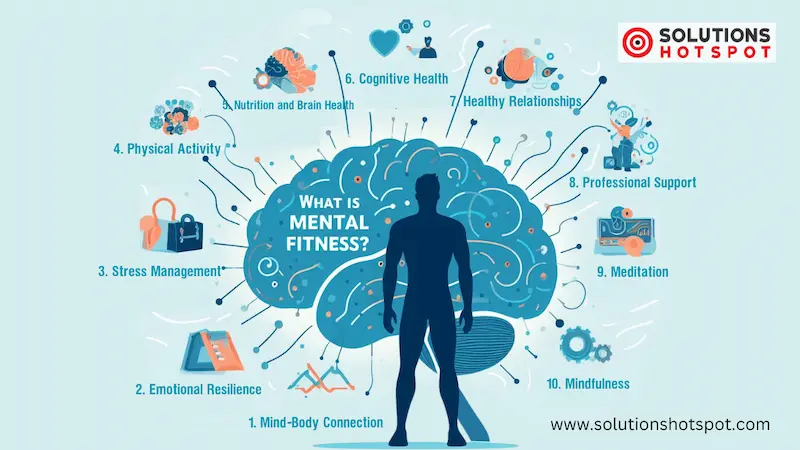What is mental fitness? In today’s fast-paced world, where stress, anxiety, and challenges abound, mental fitness has emerged as a crucial aspect of overall well-being. It’s not just about physical health but also about nurturing and strengthening the mind. This blog post delves into the concept of mental fitness, its significance, and actionable strategies to enhance it. Let’s embark on a journey to better understand and cultivate mental resilience.
Defining Mental Fitness


Mental fitness refers to the ability to cope with life’s challenges, adapt to changes, and bounce back from setbacks. It’s about maintaining good mental health and emotional well-being. A mentally fit individual possesses the emotional strength to face adversity, manage stress, and cultivate positive relationships.
The Mind-Body Connection


The mind and body are interconnected, and mental fitness plays a pivotal role in physical health. Chronic stress and negative emotions can lead to various health issues, making mental fitness essential for overall well-being. Practices like mindfulness, meditation, and yoga foster this connection, promoting mental resilience.
Building Emotional Resilience


Emotional resilience is a cornerstone of mental fitness. It involves the ability to identify and manage emotions effectively. Strategies like practicing gratitude, journaling, and seeking support from friends or professionals can enhance emotional resilience.
Stress Management Techniques


Stress is a common part of life, but chronic stress can take a toll on mental fitness. This section explores stress management techniques, including time management, deep breathing exercises, and relaxation practices like progressive muscle relaxation.
The Role of Physical Activity


Physical activity isn’t just about physical fitness; it also impacts mental health. Regular exercise releases endorphins, which can boost mood and reduce symptoms of anxiety and depression. Finding enjoyable physical activities is a key aspect of mental fitness.
Nutrition and Brain Health


Nutrition plays a significant role in mental fitness. Certain foods, like those rich in omega-3 fatty acids, antioxidants, and complex carbohydrates, support brain health and cognitive function. A balanced diet nourishes both the body and mind.
Cognitive Health and Brain Training


Cognitive fitness involves keeping the brain active and engaged. Activities like puzzles, reading, and learning new skills stimulate cognitive function, contributing to mental fitness and preventing cognitive decline.
Building Healthy Relationships


Healthy relationships are vital for mental fitness. Nurturing positive connections, setting boundaries, and effective communication are essential skills for building and maintaining meaningful relationships.
Seeking Professional Support


Sometimes, achieving mental fitness may require professional help. Therapists, counselors, and psychologists can provide valuable guidance and therapy to address specific mental health challenges.
Mindfulness and Meditation


Mindfulness and meditation practices cultivate self-awareness and improve mental fitness. They promote stress reduction, emotional regulation, and a sense of inner peace, making them valuable tools in the journey to mental fitness.
Conclusion:
Prioritizing mental fitness is a vital step towards achieving holistic well-being. By incorporating the strategies discussed in this blog post, individuals can build mental resilience, manage stress effectively, and enjoy a more fulfilling life. Mental fitness empowers us to thrive in the face of life’s challenges and fosters a positive outlook on the journey to personal growth and self-improvement.
ALSO READ:
| The Ultimate Guide to Success: 10 Habits of Highly Successful College Students
| Free Fire Returns to India: What Gamers Need to Know
| 10 Easy Tareeke Jo Exercise Ke Liye Motivation Mein Zaroori
What is mental fitness?
FAQ
Q1: What is mental fitness, and why is it important?
A1: Mental fitness refers to the ability to cope with life’s challenges, maintain good mental health, and cultivate emotional well-being. It’s crucial because it helps individuals adapt to stress, build resilience, and enhance overall well-being.
Q2: How does mental fitness affect physical health?
A2: Mental fitness has a profound impact on physical health. Chronic stress and negative emotions can lead to health issues. Mental fitness practices, such as stress management and relaxation techniques, improve physical health by reducing stress-related problems.
Q3: What is emotional resilience, and how can it be developed?
A3: Emotional resilience is the ability to identify and manage emotions effectively. It can be developed through practices like gratitude, journaling, and seeking support from friends or professionals.
Q4: What are some effective stress management techniques?
A4: Effective stress management techniques include time management, deep breathing exercises, progressive muscle relaxation, and mindfulness practices.
Q5: How does physical activity contribute to mental fitness?
A5: Regular exercise releases endorphins, which boost mood and reduce symptoms of anxiety and depression. Physical activity is essential for maintaining mental fitness.
Q6: What role does nutrition play in mental fitness?
A6: Nutrition plays a significant role in mental fitness. Foods rich in omega-3 fatty acids, antioxidants, and complex carbohydrates support brain health and cognitive function.
Q7: How can cognitive fitness be improved?
A7: Cognitive fitness can be improved through activities like puzzles, reading, and learning new skills. These activities stimulate cognitive function and prevent cognitive decline.
Q8: Why are healthy relationships important for mental fitness?
A8: Healthy relationships provide emotional support and promote a sense of belonging, which is crucial for mental fitness. Effective communication and setting boundaries are key aspects of building healthy relationships.
Q9: When should one consider seeking professional support for mental fitness?
A9: Seeking professional support is advisable when individuals struggle with persistent mental health challenges. Therapists, counselors, and psychologists can provide guidance and therapy tailored to specific needs.
Q10: How do mindfulness and meditation practices enhance mental fitness?
A10: Mindfulness and meditation practices cultivate self-awareness, reduce stress, improve emotional regulation, and promote a sense of inner peace. They are valuable tools for enhancing mental fitness.

